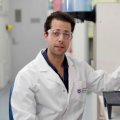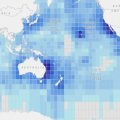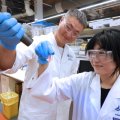What do you get when you marry the latest advances in computer science and molecular biology?
The answer is bioinformatics, one of the fastest growing areas in science and the focus of new efforts at The University of Queensland.
Each Thursday, UQ bioinformatics experts share their work and insights through the COMBIO seminar series, with all interested scholars and students welcome.
COMBIO organiser Dr Denis Bauer said bioinformatics plays a vital part of efforts such as the Human Genome Project, and will take a crucial role in future endeavours such as the sequencing of cancer genomes.
“Technology for studying molecular biology is advancing at an ever-increasing rate,” Dr Bauer said.
“This means biologists have a flood of information at their disposal, but it can be difficult for them to sort through it and pick out what is relevant.”
Researchers such as Dr Bauer develop algorithms, databases and other techniques to assist biological researchers in trawling through their data. UQ has become one of the biggest bioinformatics hubs in Australia, and is home to centres such as the Queensland Facility for Advanced Bioinformatics and the Australian Research Council Centre of Excellence in Bioinformatics.
Although the COMBIO series has been running for a number of years, it is now open to researchers from all over South-east Queensland. Dr Bauer and co-organiser Dr Philip Machanick hope the series will help promote local bioinformatics expertise and allow researchers to establish collaborations over morning teas sponsored by Next Byte, the Apple Campus Store at the St Lucia campus.
“Biologists may think they need to turn overseas in order to collaborate with bioinformaticians, but in fact there is a very strong community in Brisbane, including the Institute for Molecular Bioscience and the Queensland Brain Institute at UQ, and the Eskitis Institute for Cell and Molecular Therapies at Griffith University,” Dr Bauer said.
“COMBIO is a convenient venue to find new ideas or collaborations, and we have a number of interesting speakers lined up for 2010.”
Speakers include Dr Alexandre Cristino, who is studying wasps and honeybees to understand brain function; Professor Alan Mark, who develops simulations of a variety of important biological phenomena including some of the first atom-level simulations of protein unfolding; and Dr Nicole Cloonan, who is part of the International Cancer Genome Consortium, a worldwide collaboration to map the genomes of 50 different types of cancer.
The series is also useful for students who are interested in biology, engineering or IT to get in contact with researchers in the field.
"UQ offers bioinformatics as a major in the Bachelor of Biotechnology, Bachelor of Science and Bachelor of Information Technology programs, and COMBIO is a good way for students n the area to learn what is going on in this cutting-edge field and, if they are interested in further study, select a research group,” Dr Machanick said.
To find out more about COMBIO, visit https://sites.google.com/site/imbcombio/
Media: Dr Bauer (d.bauer@uq.edu.au) or Bronwyn Adams (07 3346 2134, b.adams@imb.uq.edu.au)
.jpg)











